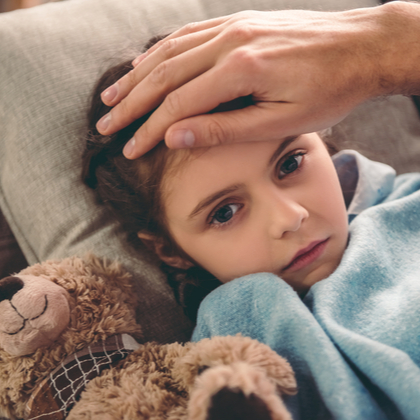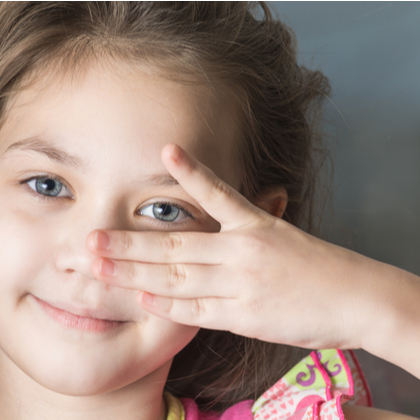
What is bronchiolitis?
Bronchiolitis is a common chest infection that mostly affects babies and children aged two years or younger. Bronchiolitis tends to be a problem particularly during the winter months from November to March.
Bronchiolitis vs bronchitis
Bronchiolitis is not to be confused with the similar sounding condition, bronchitis. With bronchiolitis, a virus attacks the bronchioles – the small tubes or airways that carry oxygen to the tiny air sacs (alveoli) of the lungs – infecting and causing blockages in the tubes. Bronchitis, on the other hand, is an infection of the bronchi, which are the larger airways in the lungs. Bronchitis can affect anyone of any age.
Causes of bronchiolitis
The virus that most often causes bronchiolitis is the respiratory syncytial virus (RSV). This belongs to the same family of viruses as the human parainfluenza viruses and the mumps and measles viruses (the human parainfluenza viruses, despite their name, are not related to the flu virus).
RSV is highly prevalent, infecting over 60 per cent of children by their first birthday and more than 80 per cent by their second (i). Bronchiolitis affects approximately one in three infants under 12 months, peaking between ages three to six months (ii).
You can read more about RSV, including how the virus spreads and how it’s treated, in our guide Respiratory syncytial virus in babies and children.
Meanwhile other viruses that can cause bronchiolitis include adenoviruses (viruses that target mucous membranes) and the flu virus.
Bronchiolitis in babies recovery time
The good news is bronchiolitis isn’t usually a serious illness. Most children develop mild symptoms that clear up after a few days, leaving them fully recovered within a month at the most. Some, however, are more at risk than others of developing more severe symptoms, including:
-
Premature babies
-
Babies born with a lower-than-average birth weight
-
Babies with an existing lung condition
-
Babies with a heart condition
-
Babies with under-developed immune systems
-
Babies with Down’s syndrome
-
Babies and toddlers who are exposed to cigarette smoke (including smoke from vaping)
Around three in 100 infants require hospital care due to bronchiolitis before they turn one (ii). Severe cases of bronchiolitis can lead to complications such as pneumonia, low oxygen levels, and breathing pauses (apnea), the latter of which is more common in premature babies or those under two months old. Dehydration is also possible as a result of reduced fluid intake. Respiratory failure, marked by inadequate oxygen supply, can occur. Additionally, bronchiolitis may trigger ear infections in some children.
Bronchiolitis symptoms
During the first two or three days the symptoms of bronchiolitis are similar to those of a cold, including a runny nose, sneezing, coughing and a mildly raised temperature (the normal temperature for babies and children is about 36.4C) (iii). However, as the infection travels down into the lungs other symptoms will start to appear, including:
-
Faster breathing
-
Difficulties with breathing
-
Wheezing
-
A persistent, dry cough
A child with more severe bronchiolitis symptoms will develop further or worsening symptoms. If your child has any of the following, contact your GP or call NHS 111 for advice:
-
Laboured and rapid breathing with drawing in of the muscles between the ribs during each breath
-
Symptoms of dehydration (these include sunken eyes, having fewer wet nappies than usual and not having passed urine for 12 hours)
-
Excessive sleepiness
-
Generally worsening symptoms
However if your child develops any of the following you need urgent medical help (call 999 or take them to the nearest hospital A&E department):
-
Lips that have turned blue
-
Long pauses in breathing or irregular breathing
-
Making a grunting noise while exhaling
-
Looking pale or mottled and feeling abnormally cold to the touch
-
Extreme agitation or confusion
-
Extreme lethargy (for instance you may find it difficult to wake them)
-
A temperature of 38C or higher in children under three months of age
Most children with bronchiolitis won’t develop any of these severe symptoms thankfully. In general, symptoms tend to get worse between days three and five, but after that things usually start to improve – though a cough may last for a few more weeks. Babies and children can develop bronchiolitis a second time, though most will only have it once.
What else could the symptoms be?
Some bronchiolitis symptoms are similar to other respiratory conditions, including bronchitis, pneumonia and asthma. Which is why if your worried about your child’s health, or they have a worsening cold with a cough for a few days it’s best to speak to your GP or call NHS 111.
Bronchiolitis treatment
Most children with bronchiolitis don’t need any special treatment and can be looked after at home. To help care for them while they’re feeling poorly and make sure they make a good recovery, there are several things you can do:
Monitor fluid intake: Children with bronchiolitis may want to drink less fluid than usual which can lead to dehydration. You can make sure they stay hydrated by using the little and often approach. Water or diluted fruit juice is suitable for older children. For struggling babies, provide smaller, more frequent bottle feeds.
Managing mild fever: To alleviate distress and reduce fever-related discomfort, consider child paracetamol or ibuprofen. Children's paracetamol is safe for babies and children over two months, while children over three months can take ibuprofen (always follow the dosage instructions on the label carefully or ask a doctor or pharmacist for advice if you’re not sure). Do not give aspirin to children under 16 years.
Antibiotics, however, will not help, as bronchiolitis is a viral infection (and antibiotics only work against bacterial infections).
Breathing more easily: Try children's saline drops to help clear a blocked nose, available for purchase at most pharmacies. Keeping your child upright when awake, even during feeding, can help them to breathe better. Meanwhile you can also raise their cot or bed head slightly to improve their breathing at night. Using a humidifier to add moisture to the air can also help with breathing and coughing.
Keep them away from smoke: Exposure to tobacco smoke can make breathing problems like bronchiolitis worse as well as increase a child’s risk of serious health conditions. Preventing them from being exposed to tobacco and vape smoke also means keeping them away from anyone who has been smoking elsewhere, including outside, as smoke can stay on your clothes after you’ve finished smoking.
Hospital treatment for bronchiolitis in babies
Most babies and children who are hospitalised with bronchiolitis are released back home as soon as the infection starts getting better. In hospital they may get help with drinking and feeding via a tube into their stomach, as well as help with breathing if they need it (assisted ventilation). If a child or baby becomes seriously ill or develops a serious complication such as pneumonia, they may have to stay in intensive care.
Hospital treatment aims to help support a baby or child with bronchiolitis, because as yet no treatment has been shown to make much of a difference to the course of the illness.
Is bronchiolitis contagious?
Since bronchiolitis is caused by a viral infection, the disease is air-borne and there is the risk of infection particularly from coughs and sneezes. Unfortunately, this means that there’s no sure way to prevent your child catching one of the viruses that causes bronchiolitis. But there are things you can do to reduce their chances of getting an infection, including:
-
Washing your hands and your child’s hands frequently (use soap and water and wash for at least 20 seconds – if soap and water aren’t available you can use an alcohol-based hand sanitiser instead). Make sure anyone else who handles your child washes their hands frequently too
-
Washing and wiping down toys regularly
-
Cleaning and disinfecting surfaces regularly
-
Limiting contact between children and anyone who has cold or flu symptoms, especially children who are aged two months or younger (this is even more important for babies who were born premature, babies and young children born with a heart or lung condition and babies with weakened immune systems)
-
Using a tissue to cover your mouth or nose if you sneeze or cough, then disposing of the tissue immediately and washing your hands. You could also wear a mask when you’re around your child if you think you have a cold or another virus
-
Fully washing and drying your child’s utensils – do not let them share cups, glasses, forks or spoons
Can I take my baby outside with bronchiolitis?
If your child does become infected, it’s a good idea keep them at home until they’ve recovered as this means they’re less likely to pass on the infection to other children.
Best vitamins for child immunity
The NHS recommends that all children aged six months to five years old take daily vitamin supplements containing vitamins A, C and D (iv). Unless your baby is having more than 500ml of infant formula each day. Babies who are being breastfed, however, should be given vitamin D every day from birth (even when their mother is taking vitamin D herself). These supplements will help the immune system to fight off infections.
Older children also need help maintaining a healthy immune system, especially during the autumn and winter months when lots of viruses including RSV are in circulation. Giving them a healthy and balanced diet with at least five portions of fruit and vegetables every day is one of the best ways to do this. Plant-based foods contain vitamins, minerals and other nutrients their bodies need.
If your child is a fussy eater you may want to consider giving them a multivitamin and mineral supplement. Not sure how to choose a multivitamin for your child? Take a look at our guide on Multivitamins for children to help you decide.
Other nutritional supplements may be helpful too, including:
Vitamin D
Children need to get the right amount of vitamin D for their immune systems to work normally. These days, all children from birth to four years old are advised to take a daily vitamin D supplement throughout the year, while those who are four years and older should take it during the autumn and winter months (though some might argue it’s best to give children of any age vitamin D supplements all year round if they don’t spend much time outdoors in the spring and summer months or if they usually wear clothes that cover up most of their skin when they’re outdoors) (v).
A good multivitamin supplement will contain the right amount of vitamin D for your child. Alternatively there are vitamin D supplements available – and if your child doesn’t like taking tablets, you can give them vitamin D drops.
Vitamin C
This important vitamin is needed for many body processes. Experts also think not getting enough vitamin C could weaken a child’s immune system (vi). You can find vitamin C in multivitamin and mineral supplements, but it’s also available as a single supplement. Try to include lots of vitamin C-rich foods in their diet too, including strawberries, blackcurrants, oranges, peppers, broccoli, kiwi fruit, cantaloupe melon and Brussel sprouts.
Live bacteria
Keeping your child’s digestive system healthy is important because the millions of micro-organisms and bacteria that live in the human digestive system are thought to play a key role in immune response, as well as overall health and fitness. In fact experts believe around 80 per cent of immune tissue is found within the digestive tract (vii).
Acidophilus and other types of live bacteria may help boost the immune system and reduce the risk of viral infections, with some studies suggesting they may help prevent and relieve symptoms of colds and other infections in both adults and children (viii). One study also suggests taking certain types of live bacteria may shorten the length of a cold by almost two days as well as reduce the severity of symptoms (ix).
Supplements that contain live bacteria are usually recommended for children aged four years and older. Food sources include yoghurt, kefir, sauerkraut, miso and tempeh.
Fruit concentrates
Suitable for children aged five upwards, products that include natural concentrates such as elderberry, blackcurrant and rosehip – all good sources of beneficial antioxidant plant compounds – are often recommended by nutritional therapists for immune support, especially in the winter months (though you can take them all year round too).
For example elderberries – grown on the Sambucus tree – have a long traditional use for the relief of cold and flu symptoms (though they should never be eaten raw as they can cause nausea, vomiting and diarrhoea). Fruit concentrates products in a liquid format are ideal for children – look for those that are naturally sweetened with fruit juice with no added sugar or artificial sweeteners.
More ways to boost children’s immune system resistance
As well as giving them nutritious foods and supplements, some of the other things that may help keep your child’s resistance to viruses and other germs strong include:
-
Making sure they get plenty of sleep (read our guide to children’s health: sleep for more details)
-
Keeping them moving (regular activity can help keep children’s resistance higher)
-
Encouraging play and other fun activities (reducing stress in children could help make them less susceptible to infections)
-
Keeping their jabs up to date (ask your GP for details)
If your child has a medical condition that makes it harder for them to manage viruses and other bugs, your GP can advise you about other precautions you can take to keep them healthy.
Need more information about children’s health?
There’s lots more about a range of conditions that can affect children in the children’s health section of our pharmacy health library. For details about respiratory conditions that affect adults, take a look at our respiratory health section.
References:
-
Available online: https://patient.info/chest-lungs/bronchiolitis-leaflet
-
Available online: https://www.blf.org.uk/sites/default/files/Bronchiolitis_RSV_downloadablePDF_3ed.pdf
-
Available online: https://www.nhs.uk/conditions/baby/weaning-and-feeding/vitamins-for-children/
-
Available online: https://www.nhs.uk/conditions/vitamins-and-minerals/vitamin-d/
-
Maggini. S, Wenzlaff. S, Hornig. S. Essential role of vitamin C and zinc in child immunity and health. J Int Med Res. Mar-Apr 2010;38(2):386-414.Available online: https://journals.sagepub.com/doi/10.1177/147323001003800203
-
Available online: https://patient.info/news-and-features/how-to-boost-your-immune-system
-
Kang EJ. et al., The effect of probiotics on prevention of common cold: a meta-analysis of randomized controlled trial studies. Korean J Fam Med. 2013 Jan ;34(1):2-10. Available online: https://www.ncbi.nlm.nih.gov/pmc/articles/PMC3560336
Rerksuppaphol S. et al., Randomized controlled trial of probiotics to reduce common cold in schoolchildren. P2012 Oct. 2013 Jan ;54(5):682-7. Available online: https://onlinelibrary.wiley.com/doi/abs/10.1111/j.1442-200X.2012.03647.x
Keyer GJ. et al., Effect of Lactobacillus Gasseri PA 16/8, Bifidobacterium Longum SP 07/3, B. Bifidum MF 20/5 on common Cold Episodes: A Double Blind, Randomized, Controlled Trial. Clin Nutr. 2005 Aug ;24(4):481-91. Available online: https://www.clinicalnutritionjournal.com/article/S0261-5614(05)00027-0/fulltext
Related Posts
Disclaimer: The information presented by Nature's Best is for informational purposes only. It is based on scientific studies (human, animal, or in vitro), clinical experience, or traditional usage as cited in each article. The results reported may not necessarily occur in all individuals. Self-treatment is not recommended for life-threatening conditions that require medical treatment under a doctor's care. For many of the conditions discussed, treatment with prescription or over the counter medication is also available. Consult your doctor, practitioner, and/or pharmacist for any health problem and before using any supplements or before making any changes in prescribed medications.

Christine
Christine Morgan has been a freelance health and wellbeing journalist for almost 20 years, having written for numerous publications including the Daily Mirror, S Magazine, Top Sante, Healthy, Woman & Home, Zest, Allergy, Healthy Times and Pregnancy & Birth; she has also edited several titles such as Women’ Health, Shine’s Real Health & Beauty and All About Health.
View More



